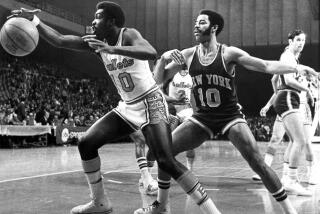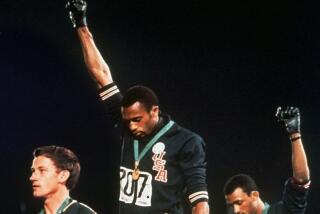Seoul ’88 : Maree Would Lift South Africa Ban
- Share via
There may be better ways to make a living. But because so few of them were available to Sydney Maree when he was younger, he is glad to be here, in the unkempt holding area of East Berlin Schoenfeld Airport, waiting for a flight to another city and another track meet.
It is not yet 9 a.m., but many of the other foreign travelers are at the bar, ordering something more potent than orange juice. Look at most of the destinations on the departure board, and you understand the need for a sedative.
Moscow. Prague. Bratislava. Havana.
Maree asks someone to bring him an orange juice. He is going to Helsinki.
The night before, Maree had run the 1,500 meters in East Berlin’s Olympic Day meet. Unaware that a rabbit had been assigned to the race to push the pace, he fell far behind in the first half and then had to start his kick earlier than usual to finish third.
“What happened?” Maree asked the runner-up, East Germany’s Andreas Busse, after the race.
“We wanted to run fast today,” Busse told him.
“Oh, but you didn’t want anyone else to know you wanted to run fast,” said Maree, believing he had been deceived.
Busse smiled.
On this evening, in Helsinki, Maree, running tired, again would have to make a frantic combat on the final lap to finish second.
Two nights later, he would finish fourth in the 5,000 at Oslo.
Tuesday night, he will run a 1,500 in Stockholm.
The travel is wearing even for a 31-year-old athlete, the pay is not as lucrative as it was when he was setting world records, and job security depends on something so delicate as his hamstrings. But Maree’s only complaint is that life on the international track and field circuit is not accessible to athletes in his native South Africa.
Because of that country’s policy of apartheid, or racial separatism, South African athletes have been banned from competing internationally in most sports, including track and field.
Those who support the ban are well-intentioned. They will use whatever means possible to pressure South Africa into giving the same rights to its blacks as it does to its whites. The problem with the ban, and its supporters are the first to admit this, is that it punishes athletes who are not responsible for apartheid. Worst of all, it punishes black athletes, who are supposed to be among the beneficiaries of the ban.
Maree, who is black, was banned until he was 24. Those who dared run against him were subject to the “Contamination Rule,” meaning that they could also be banned.
But because he was a student at Villanova, the International Amateur Athletic Federation, which governs track and field, reclassified him in 1981 as a permanent resident of the United States, enabling him to compete internationally. In 1984, he became a U.S. citizen and was a member of the Olympic team in Los Angeles, although he did not run because of an injury.
If we have learned anything from Zola Budd’s example, however, it is that South African natives will continue to be closely scrutinized even after they become citizens of other countries. In that sense, they forever will be segregated.
Before Budd’s case was brought before the IAAF’s kangaroo court in London earlier this year, Maree received word from The Athletics Congress, the U.S. governing body of track and field, that he also was under investigation.
“I was told to keep a low profile and give no interviews until we knew what the charges were,” Maree says. “I’ve been back to South Africa, and I didn’t know what kind of charges they might bring up.”
TAC’s executive director, Ollan Cassell, will not comment, except to say through a spokesman that it is no longer an issue. But Maree reportedly was accused of conducting running clinics in South Africa, which could be perceived as violating an IAAF rule forbidding participation in South African athletics.
The IAAF proved in Budd’s case that it can bend the rule to cover just about anything. One of her transgressions included accepting flowers from a young girl while watching a road race in South Africa.
Maree, however, has been cleared and will attempt to qualify for the U.S. Olympic team in the 5,000 meters.
“I think the British were behind it, claiming that there were different rules for Sydney and Zola,” Maree said. “But Ollan Cassell wouldn’t stand for any of that stuff. He didn’t allow the whole thing to become an issue.”
Maree says he returns to his home in Pretoria, South Africa, for about six weeks each winter to visit his family and train. He has conducted clinics there, for black and white children, but he says he discontinued them when he became a U.S. citizen. That no doubt was considered a major victory against apartheid.
“TAC told me that the charges were baseless, but that I should still be careful about what I say,” Maree says. “I was ready to blast them (the IAAF) for what they did to Zola. I know of what I went through before 1981. It’s a very painful situation.”
Maree says he believes the same man who prevented him from competing, Sam Ramsamy of the South African Non-Racial Olympic Committee (SANROC) in London, also led the fight against Budd. As an Indian born in South Africa, Ramsamy was classified as colored, which is one class above black.
“They (SANROC) said that I was with the South African government because I did not join their side and I did not denounce apartheid, but it was ridiculous,” Maree said. “I’ve been hurt by apartheid all of my life.”
Someone asked if Maree would eliminate the ban against South African athletes.
“To tell you the truth, I would like to see all South Africans compete internationally,” he said. “If we can play with the Soviet Union, we can play with South Africa and still isolate them where necessary.
“White South Africans believe that things are now in South Africa the way they are supposed to be. They believe God gave them the black man to serve them. I’ve talked to friends in the United States who said they were prejudiced when they were growing up because they didn’t know any better. That’s the way white South Africans behave.
“But if they could go outside and see how other people live, they would be exposed to how people respect each other and interreact with different races internationally.”
Others argue persuasively in favor of the ban. But as perhaps the only black South African who has a chance to compete in Seoul, Maree’s voice should be heard.
More to Read
Go beyond the scoreboard
Get the latest on L.A.'s teams in the daily Sports Report newsletter.
You may occasionally receive promotional content from the Los Angeles Times.






